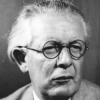Jean Piaget

Jean Piaget
Jean Piagetwas a Swiss clinical psychologist known for his pioneering work in child development. Piaget's theory of cognitive development and epistemological view are together called "genetic epistemology"...
NationalitySwiss
ProfessionScientist
Date of Birth9 August 1896
CityNeuchatel, Switzerland
CountrySwitzerland
past men law
At one time, many philosophers held that faultless "laws of thought" were somehow inherent, a priori, in the very nature of mind. This belief was twice shaken in the past century; first when Russell and his successors showed how the logic men employ can be defective, and later when Freud and Piaget started to reveal the tortuous ways in which our minds actually develop.
reality building-up understanding
The essential functions of the mind consist in understanding and in inventing, in other words, in building up structures by structuring reality.
sensual logic mathematics
Logic and mathematics are nothing but specialised linguistic structures.
children balance looks
Mixture of assimilation to earlier schemas and adaptation to the actual conditions of the situation is what defines motor intelligence. But and this is where rules come into existence as soon as a balance is established between adaptation and assimilation, the course of conduct adopted becomes crystallized and ritualized. New schemas are even established which the child looks for and retains with care, as though they were obligatory or charged with efficacy.
invention
To understand is to invent.
teaching school trying
The more we try to improve our schools, the heavier the teaching task becomes; and the better our teaching methods the more difficult they are to apply.
independent mind pressure
Moral autonomy appears when the mind regards as necessary an ideal that is independent of all external pressures.
children lying naughty
The child who defines a lie as being a "naughty word" knows perfectly well that lying consists in not speaking the truth. He is not, therefore, mistaking one thing for another, he is simply identifying them one with another by what seems to us a quaint extension of the word "lie".
children attitude intellectual
In certain circumstances where he experiments in new types of conduct by cooperating with his equals, the child is already an adult. There is an adult in every child and a child in every adult. ... There exist in the child certain attitudes and beliefs which intellectual development will more and more tend to eliminate: there are others which will acquire more and more importance. The later are not derived from the former but are partly antagonistic to them.
strong mean support
This means that no single logic is strong enough to support the total construction of human knowledge.
static process instance
Scientific thought, then, is not momentary; it is not a static instance; it is a process.
children teach inventing
Everytime we teach a child something, we prevent him from inventing it himself.
action individual abstraction
Reflective abstraction, however, is based not on individual actions but on coordinated actions.
self law causes
The self thus becomes aware of itself, at least in its practical action, and discovers itself as a cause among other causes and as an object subject to the same laws as other objects.